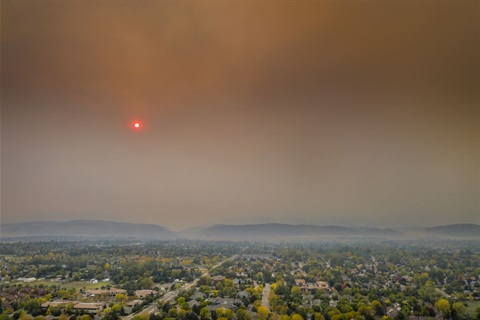Health risks from wildfire smoke
Published on August 01, 2024

The Northern Front Range currently has three active wildfires: the Alexander Mountain in Loveland, Stone Canyon near Lyons, and Quarry in southwestern Denver Metro. Though Weld County is not directly affected by the wildfire, much like during the Cameron Peak and Mullen fires in 2020, our region may be impacted by the smoke, especially those living in closer vicinity to those wildfires. At this time, we don’t expect major public health impacts from the smoke in Weld County. Reducing exposure to wildfire smoke is important to our health, especially for children, older adults, and people with heart or lung disease. The following are suggested actions you can take if you are concerned about smoke exposure.
Reduce smoke exposure indoors:
- Stay inside with doors and windows closed.
- Don’t make the indoor air worse. Avoid burning candles, smoking tobacco, vacuuming, frying or broiling meat.
- Use a portable air cleaner.
- Use high efficiency filters in your air conditioner system.
Reduce smoke exposure outdoors:
- Take it easier during smoky times to reduce how much smoke you inhale.
- Smoke can be worse at night, so take extra precautions if you need to go out.
- Know your air quality. Check airnow.gov for air quality forecasts and current conditions.
- Use an N95 respirator. Dust masks or bandanas will not protect you from smoke.
- Reduce smoke in your vehicle by closing windows and vents and run fans in recirculate mode.
- If you have asthma, follow your asthma management plan. Have enough medication on hand.
At this time, it is best to avoid any outdoor fires, including recreational fires, fireworks, charcoal, and food smokers.
Current smoke forecast information can be found at US Interagency Wildland Fire Air Quality Response Program.
General wildfire information is at ready.gov/wildfires.
Dr. Annareli Morales, PhD
Air Quality Policy Analyst
Weld County Department of Public Health and Environment
970-400-2222 | amorales@weld.gov